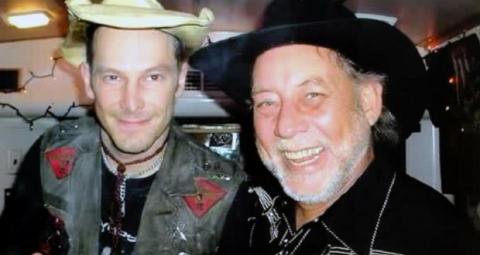Bounty hunter shoots US country musician dead in gunfight

A photo of Randy Howard (right) shared by Hank Williams III with the caption “RIP Randy Howard”. Photograph: www.facebook.com/hank3
Randy Howard was wanted on DUI charge, previously shared stage with Willie Nelson
A country music singer wanted on a drink driving charge has been shot dead by a bounty hunter in a gunfight at the musician’s home, authorities said.
The Tennessee Bureau of Investigation is looking into the circumstances of the shooting of 65-year-old Randy Howard, spokesman Josh DeVine said.
Howard had been charged with fourth-offence DUI, possession of drug paraphernalia, possession of a firearm while intoxicated and driving on a revoked licence, Mr DeVine said, and had missed a court appearance.
Howard’s friend Terry Dotson told Nashville TV station WSMV that he tried to drive Howard to his court appearance, but the singer brushed him off.
“He said he wasn’t going back to jail. That’s what he told me,” Mr Dotson said.
On Tuesday night, bounty hunter Jackie Shell showed up at Howard’s home to take him into custody, Mr DeVine said, adding that Howard opened fire, Mr Shell shot back and Howard was killed.
Mr DeVine said Mr Shell was injured in the shooting, but did not say how badly. The bounty hunter’s mother Mary Jane told the Chattanooga Times Free Press that her son underwent surgery.
When asked if authorities were investigating whether Mr Shell had the right to enter Howard’s home, Mr DeVine said he could not discuss specifics, but that the “investigation includes all aspects of the incident”.
Howard made seven records, including All American Redneck for Warner Bros in 1983, and the self-titled Randy Howard for Atlantic in 1988.
He shared the stage with Willie Nelson, Waylon Jennings and Hank Williams Jr, and wrote songs for Hank Williams III, according to Howard’s LinkedIn site.
Hank Williams III posted a picture on his Facebook page of him and Howard smiling together under the words, “RIP Randy Howard”.
He embraced the term “redneck”. In an interview in 1983, he said the derogatory term for poor, white, rural southerners does not have to be offensive.
“It can be positive,” he said. “When I play clubs, I ask if there are any rednecks out there. I get a good response whether I’m in New York or Miami.”
PA
Source: The Irish Times
